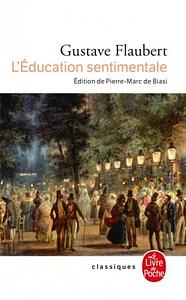Take a photo of a barcode or cover
reflective
slow-paced
reflective
slow-paced
Plot or Character Driven:
Character
Strong character development:
Yes
Loveable characters:
No
Diverse cast of characters:
Yes
Flaws of characters a main focus:
Yes
Flaubert is rather brilliant in this somewhat plotfree satire . Unusual in the way that the political upheaval is both on every page and almost irrelevant next to the amorous pursuits of the protagonist. Feels both silly and true.
relaxing
medium-paced
Plot or Character Driven:
Character
Strong character development:
No
Loveable characters:
No
Diverse cast of characters:
No
Flaws of characters a main focus:
No
This novel contains approximately 600 pages of an unlikeable womanizer NOT having sex with the woman for whom he maintains a life-long boner.
And yet, I couldn't wait to read it to the end. That's French literature for you!
And yet, I couldn't wait to read it to the end. That's French literature for you!
slow-paced
adventurous
dark
emotional
inspiring
mysterious
reflective
sad
tense
slow-paced
Plot or Character Driven:
Character
Strong character development:
Complicated
Loveable characters:
Complicated
Diverse cast of characters:
Yes
Flaws of characters a main focus:
Yes
This took such a long time to read, partly due to my preoccupation in graduate studies and partly due to my general disinterest in the novel. Flaubert's prose is much less engaging in this volume than in Madame Bovary, and his social critique is too abstract to hit where it matters. A lesser Balzac all around.
Frédéric was overcome with joy and had difficulty in restraining himself from singing; he felt the need to share his happiness with someone, to perform some act of charity. He looked around to see if there was anybody needing help. There was no poor wretch in sight at the moment; his generous impulse petered out; and he was never one to go out searching for that kind of opportunity.A would be rebel without a cause; a would be satirist who pays little heed to what makes a satire; a white man with a pension and, therefore, nearly all the time and opportunity in the world. Take out every classic that wasn't written by someone who was necessitated by the lottery of their birth to work for a living, and you have a poor pittance left behind. Some works are more obvious in their having originated in one venue or the other, and the introduction my particular edition of this work of Flaubert's made it extremely simple to connect the dots and see this Frédéric Moreau as a walking, talking, and ultimately flitting sentiment of the author himself. It's not as if the work couldn't still have been good, even great, within such a context. However, in the decade since I committed to reading this, I read Maugham's <>Of Human Bondage not once, but twice: the first in absolute enamorment, the second in critical reflection. Flaubert takes on more in his social portrait, whether it be the persons of various classes and ideologies, the details of interior decoration, or the politics that dramatically promised so much and ended in a reactionary whimper, and on the level of that, I appreciate this work. However, the piece entire is a sardonic, frittering, have-your-vindictiveness-and your compassion-too equivocation of a work, and for all its cold hearted machinations and imperfect humanities, it commits to neither the glorious devilry of [b:Les Liaisons dangereuses|49540|Les Liaisons dangereuses|Pierre Choderlos de Laclos|https://i.gr-assets.com/images/S/compressed.photo.goodreads.com/books/1298425654l/49540._SY75_.jpg|3280025] nor the inescapable axe-in-a-frozen-sea of [b:The Sound and the Fury|10975|The Sound and the Fury|William Faulkner|https://i.gr-assets.com/images/S/compressed.photo.goodreads.com/books/1433089995l/10975._SY75_.jpg|1168289] in its effort to write the 'real', but not 'real' to the point of circumventing its own stereotypes and bad faith assumptions. So, a breath of fresh air in some sense from the kind of classic forever stuffing a moral or a meaning into their sentiment soaked yet myopic meanderings, but all in all, I'd more readily have sympathy for the devil than Frédéric Moreau; all that is left for such a character, then, is to entertain, and Flaubert, for all his nitpickings, took himself a tad too seriously for that.
[H]is respect for authority was so great that he'd have paid to sell his own conscience!I've been inundated with translations from the French of late through various coincidences and statistical points, and even the odd recently finished English work concerned itself with the 1848 Revolution, although in a much more straightforwardly superficial manner than Flaubert committed himself to doing. As such, I have a far deeper, if still primarily tangential, awareness of 19th c. French history and the interchange between its various governments and its various peoples, and while Flaubert, for all his meticulous note taking, is probably one of the least trustworthy writers when it comes to portraying the events in a manner that conveys the reality of what was at stake for those who lived it, every odd fact that he lets slip amongst the stamp-down-on-the-radicals and criticize-but-not-too-much-the-rich (feminists pissed him off enough to get their own category of gross mischaracterizations) is enough for me to draw my own conclusions, especially with twenty-one pages of end notes to guide me in the right direction. All in all, though, Flaubert's willingness to dive into the early 19th c. milieu of Paris and spend quite a bit of time talking sordid politics and other such conversations that no true blooded "American" would feel comfortable discussing in public made the work all the better in my mind, thus allowing me to enjoy myself whenever the focus wasn't on the thin-blooded exchanges on the stock markets of human capital and human flesh that certain cishet pontificators love to call 'romance.' Indeed, if the idiotically blithe Frédéric had completed his education and fully committed to his transformation into a creature with bank notes for blood and property deeds for a soul, the book, in my opinion, would have been all the better for it. Alas, this work's major flaw of being middle class to a fault won the day, and while I'm not the type to decry a work for not having a happy ending, I can at least be rather miffed at a conclusion that wasn't as interesting as it could easily have been. Sentiment, of course, was the name of the game. But it didn't have to be nearly as pitiful a resolution as the letter of the law of the word's definition prescribed it to be.
As tends to be the case with writers these days, Flaubert was much more queer in his biographical undertakings than has been commonly represented in the sorts of high schools that assign 'Madame Bovary' as required reading. As such, while I doubt I'll make my way to any of his other fiction, I wouldn't mind reading of a biography of him that really knew what it was doing in regards to topics such as sex work, bisexual or otherwise. True, a great deal will likely be as boring as was the pages when Frédéric could seemingly do nothing but stumble his way into gaining notorious mistresses and establishing extraordinary social networks and feeding upon deus ex machina fortunes through nothing more than sheer laziness and the most mediocre of engrained habitus, but Frédéric never traveled as Flaubert did. Such a reading will probably not take place for a long while, partially due to my having my doubts as to whether such a quality piece of nonfiction exists, partially due to the literal hordes of other works by authors whom I haven't yet encountered even once awaiting my perusal. In terms of this work here, yet another of those 'classics' that don't have very much to them beyond the comfort it affords to certain classes of readers with undue amounts of influence in the modern reading landscape, but there were certain episodes what were worth the ticket price of reading the entire piece, and the scene of the duel will likely remain one of my favorite short sections of all time. Whether other readers find such convincing enough to trudge through 400-600 pages of what can be easily summed up as "white boy nonsense à la française" is up to them, but for me? I had enough side laughs to ease the way, and there's no arguing with the serotonin one gets from having finally put a much lauded piece behind them for good.
Most of the men there had served under at least four governments and would have sold their country or mankind to protect their wealth, get themselves out of financial difficulties or other trouble, or even through sheer lack of principle, a deep inborn respect for force. They all declared that political crimes were unforgivable! It was easier to excuse those brought about by dire necessity! And inevitably out trotted the example of the bread-winner stealing the proverbial crust from the proverbial baker.
challenging
dark
emotional
funny
informative
reflective
sad
tense
slow-paced
Plot or Character Driven:
A mix
Strong character development:
Yes
Loveable characters:
Complicated
Diverse cast of characters:
Yes
Flaws of characters a main focus:
Yes


